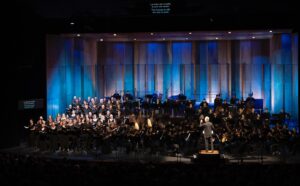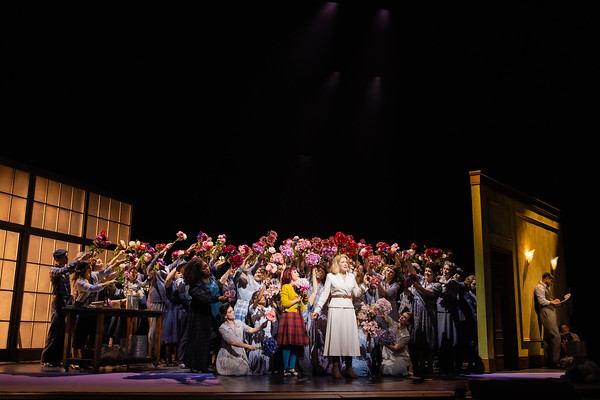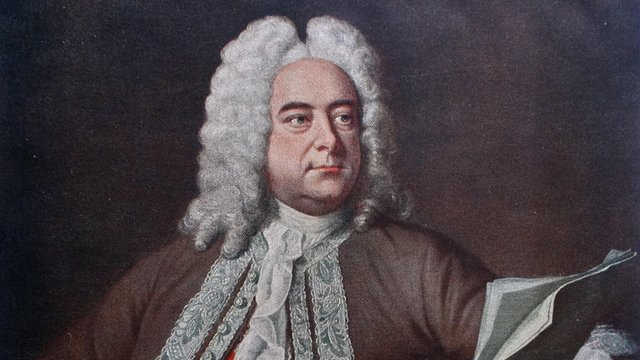
Festival d’Aix-en-Provence 2023 Review: Le Prophète
By João Marcos Copertino(photo credit: Festival d’Aix-en-Provence © Vincent Beaume)
In the audience, on my right side, a young person wears a T-Shirt that reads “Meyerbeer Fan.” On my left side, a spinster cries “Justice for Meyerbeer.” Rarely does an opera in concert raise so many people’s spirits. But, Giacomo Meyerbeer is not a composer. He is an idealist.
History has Dreyfuss, but only opera has Meyerbeer. His music was important during the nineteenth century, however it virtually vanished from operatic stages after the advent of the long play. Nowadays, we have scarce representation here and there, most of the time without the needed pomp and circumstance, and it is a crime. But, I understand why.
Meyerbeer’s Operas Are Dangerous
Attending a concert version of Meyerbeer’s “Le Prophète,” with libretto by the always excellent Eugène Scribe, reminds me why Meyerbeer matters so much. It would be hard to see “Le Prophète” in America, especially nowadays, without reflecting on how things are going awry and thinking that maybe intolerance has won.
“Le Prophète,” like most of Meyerbeer’s operas, falls under the umbrella term of “grand opera.” The grandness of his opera, however, usually relies on its combining a very skeptical approach both to mundane politics and to any form of empty idealism with a concomitant apotheosis of interpersonal relationships. In a certain way, all of his operas question what it is that we owe each other in the most immediate sense.
His rendering of political grandiloquence and idealism, blended with a fool’s intolerance, is musically grand. But, his operas always succumb to the voice of the main heroes. The tenor and the soprano might die in the end, but not until their voices are heard singing louder than all of their pitiless detractors.
Melodrama at Its Highest
Such virulent conviction and pungent dramatical force in “Le Prophète” was slightly undermined because it was a one-night-only concert performance. However, any frustration was compensated for by its extraordinary performance. Meyerbeer’s music requires ambitious and more than competent musicians. The music is extremely demanding for all musicians involved, and there is little room for performers who are not extraordinary. One might also find it hard to not resort to clichés.
The cast was led by Elizabeth DeShong and John Osborn, both Americans with great French diction. Anyone who hears DeShong’s spoken voice in the many interviews available online might not see how amazing her singing voice sounds when performing melodrama. Her mezzo-contralto tone is extremely rich and warm. Her voice is larger than life, and her coloratura is also commendable. However, what makes her Fidès particularly remarkable is her capacity to be both a severe and tender mother.
Meyerbeer allows much space for dynamic variations in his music and DeShong takes as many opportunities as she can. To not say it was all roses, I would have been much happier, had DeShong not used a score. I understand it is a concert version, but it is, at least to me, a bit of a turn off when the singer, who is singing the most difficult coloraturas, has to turn pages. However, this was a minor distraction in an exhilarating performance.
A Cast of Bold Singers and Musicians
John Osborn was certainly the most adventurous. His voice is not as overwhelmingly big as his peers, but he mastered his performance with an ambitious approach to Meyerbeer’s music. His singing was always expressive. He amused the audience with his falsetto and mezza-voce. This gave his character a vocal register that was closer to what was vocally demanded in the 1830s. His sustained high notes were always impressive, but what lingers in my mind was his approach to a character who is not always filled with the best intentions. His characterization of Jean made the role more charismatic and complex than it would have been with most other tenors.
Soprano Mané Galoyan was an immense delight. A lyric-spinto with much strength and dynamic control. She captivated the audience from moment one of Act one. Among all of her great accomplishments, I must say that the most historical moment is her death scene, accompanied by a beautiful cello solo in the final three minutes or so of the trio,“Ô spectre, ô spectre épouvantable!” The only studio recording of this opera is Sony’s, under the direction of Henry Lewis, and it edits out this moment, unfortunately.
In Galoyan’s rendering, her final aria was an extraordinary theatrical death in which her voice progressively ceded its place to the orchestra where it then became alive in a melodic and wordless mode. This moment can only be heard in the four hours and thirty minutes long Radio France broadcast of the Aix performance, and it happens around 4h14min.
A True Grand Opera
The trio of anabaptist revolutionaries was in perfect synchronicity. James Platt inundated the theater with his cavernous bass voice. His voice filled every note of “flint omnium.” Guilhem Worms seems to be extremely well-suited to his part, with much panache. He is clearly a singer to be watched. Valerio Contaldo completed the trio with a heroic sense of their wickedness. Edwin Crossley-Mercer completed the cast with a more than solid bass-baritone performance of incarnating a villainous version of a Latin Lover.
The trio of soldiers was more than competently sung by Maxime Melnik, Hugo Santos, and David Sánchez. The choir of Lyon Opera started a bit recalcitrant, but its contributions were solid by the end of the opera. Special attention must be given to the work of Mark Elder commanding the London Symphony Orchestra (LSO) and the Orchestre des Jeunes de la Méditerranée. They are certainly the most capable orchestral group in town, which is saying a lot. The LSO met all of the great demands in Meyerbeer’s score. The music never sounded like a caricature of a grand opera because they remained focused on the tonal magnitude of this work.
This was certainly a night to remember.


